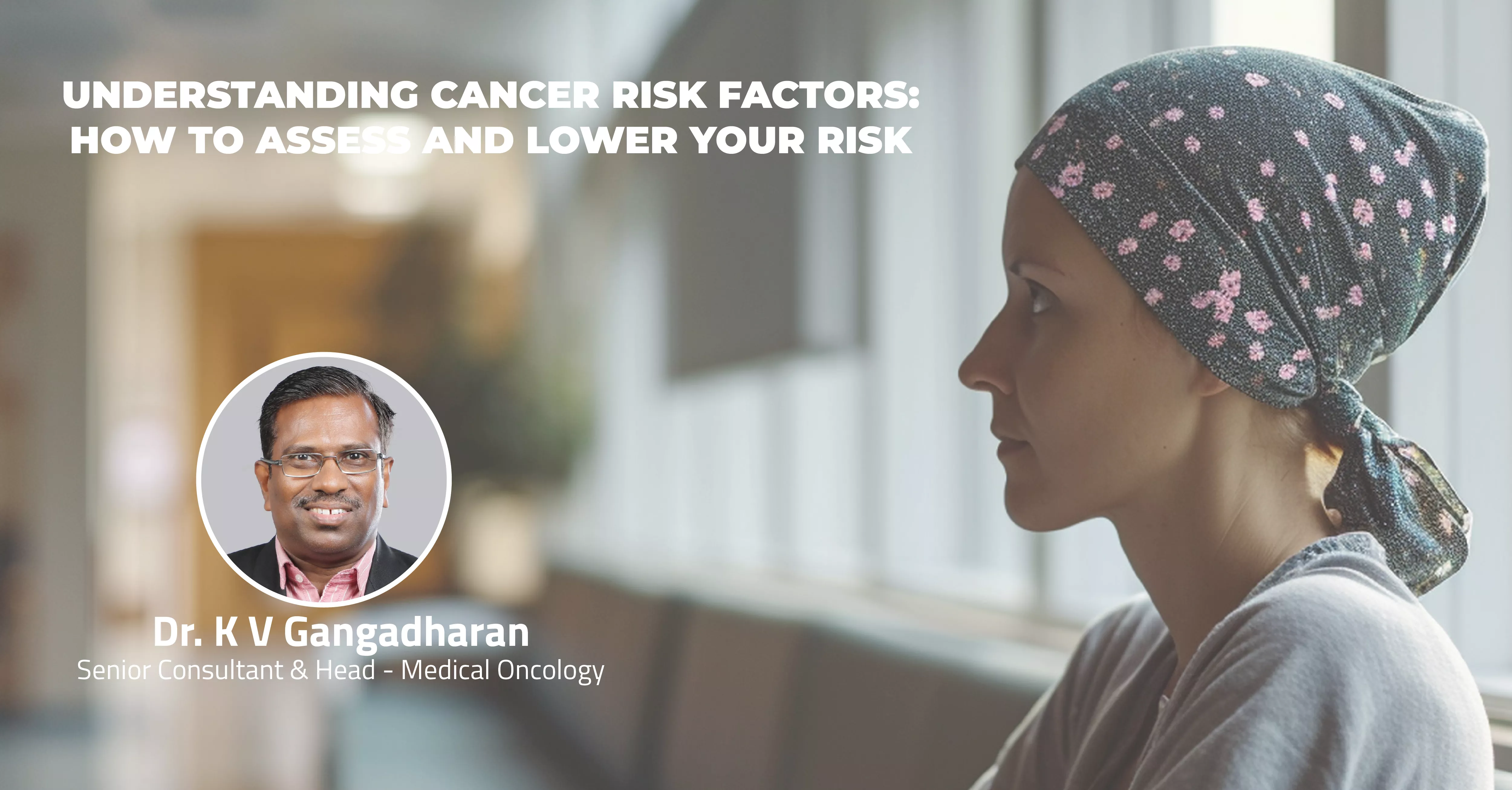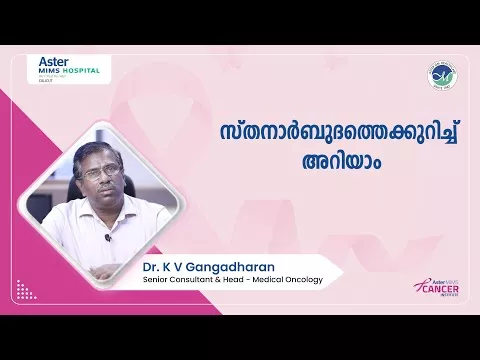Cancer is a complex disease, influenced by a range of factors that can increase the likelihood of developing the condition. While some risk factors are beyond your control, such as age or genetics, many can be managed through lifestyle choices. Understanding these factors and making adjustments can be a powerful way to reduce your cancer risk.
At Aster Mims Calicut, a leading oncology hospital, we are dedicated to not only providing advanced treatments but also educating our patients on how to reduce cancer risks through preventive care. In this blog, we will explore the main cancer risk factors, how to assess your risk, and steps you can take to lower that risk.
What Are Cancer Risk Factors?
Cancer risk factors are characteristics or behaviors that can increase the likelihood of developing cancer. These can be broadly classified into two categories:
- Non-modifiable Risk Factors: These are factors you cannot change, such as genetics, age, and family history. For instance, older adults tend to have a higher cancer risk, and individuals with a family history of certain cancers may be more predisposed to developing them.
- Modifiable Risk Factors: These are lifestyle choices or environmental exposures that you can control. Examples include smoking, alcohol consumption, diet, physical activity, and exposure to harmful substances. Modifying these risk factors can significantly reduce your chances of developing cancer.
How to Assess Your Cancer Risk
The first step in cancer prevention is understanding your own risk. Here are the main factors that can help you assess your cancer risk:
- Family History and Genetics: A family history of certain types of cancer can increase your risk. Genetic mutations passed down from one generation to another can also play a significant role. For example, mutations in the BRCA1 or BRCA2 genes increase the risk of breast and ovarian cancers. Genetic testing and counselling at an oncology hospital like Aster Mims Calicut can help you understand your genetic risk.
- Lifestyle Choices: The lifestyle you lead has a profound impact on your cancer risk. Diet, physical activity, alcohol consumption, and smoking are key factors that influence cancer development. Poor lifestyle choices can increase your risk, while healthier habits can significantly reduce it.
- Environmental and Occupational Exposures: Exposure to carcinogens in the environment or in the workplace can contribute to cancer. For example, prolonged exposure to asbestos or certain chemicals can increase the risk of lung and mesothelioma cancers. Protecting yourself from these risks is essential for prevention.
- Pre-existing Health Conditions: Certain medical conditions, such as chronic inflammatory diseases or viral infections like HPV, can elevate cancer risk. If you have such conditions, it's important to work closely with your oncologists to monitor and manage the risk.
How to Lower Your Cancer Risk
While some factors, like age or genetic makeup, are out of your control, there are several effective ways to lower your cancer risk. Here are practical tips to help you reduce your likelihood of developing cancer:
- Avoid Smoking: Tobacco use is one of the most significant preventable risk factors for cancer. It is directly linked to cancers of the lung, mouth, throat, and more. Quitting smoking is one of the most powerful ways to reduce your cancer risk, and it has immediate and long-term health benefits.
- Limit Alcohol Consumption: Drinking alcohol in excess can increase the risk of several cancers, including breast, liver, and colorectal cancers. The American Cancer Society advises limiting alcohol consumption to one drink per day for women and two for men to minimize cancer risks.
- Maintain a Healthy Weight: Being overweight or obese increases the risk of several types of cancer, such as breast, colon, and kidney cancer. Maintaining a healthy weight through a balanced diet and regular exercise is crucial in reducing cancer risk.
- Eat a Balanced Diet: Diet rich in fruits, vegetables, whole grains, and lean proteins can help lower your cancer risk. Specifically, foods high in fiber and antioxidants can protect cells from damage and reduce the risk of cancer. Limit your intake of processed foods, red meats, and sugary drinks, as these can increase cancer risk.
- Exercise Regularly: Regular physical activity has been shown to reduce the risk of cancers like breast, colon, and endometrial cancer. Aim for at least 150 minutes of moderate-intensity exercise per week, such as brisk walking or cycling, to help maintain a healthy body and reduce your risk.
- Protect Yourself from UV Radiation: Ultraviolet (UV) radiation from the sun or tanning beds is a major cause of skin cancer, including melanoma. To reduce the risk of skin cancer, wear sunscreen with a high SPF, seek shade, and avoid tanning beds. It's also important to wear protective clothing when exposed to the sun for extended periods.
- Get Regular Screenings: Regular cancer screenings help detect cancers early when they are most treatable. Screenings for breast, colorectal, cervical, and prostate cancers are essential, especially if you are at higher risk due to family history or other factors. Your oncologist at Aster Mims Calicut can guide you on the appropriate screening schedule based on your age, health status, and family history.
- Vaccinate Against Preventable Infections: Vaccines are available to protect against cancers caused by viral infections, such as the human papillomavirus (HPV) and hepatitis B (HBV). Vaccination against these viruses can significantly reduce the risk of cervical, liver, and other cancers. Speak with your healthcare provider about vaccination options.
- Limit Exposure to Environmental Carcinogens: Avoid exposure to known carcinogens, such as asbestos or certain chemicals, especially in occupational settings. Taking safety precautions in the workplace and being mindful of environmental pollutants can reduce your cancer risk.
Cancer Risk Assessment at Aster Mims Calicut
At Aster Mims Calicut, our team of skilled oncologists is here to help you assess your cancer risk. We offer genetic testing, lifestyle evaluations, and screenings to give you a clearer picture of your risk. With this information, we can recommend specific strategies to lower your risk and improve your overall health.
Through a combination of early detection, preventive care, and lifestyle management, we help patients take control of their cancer risk. Our expert team will work with you to develop a tailored plan for cancer prevention and ongoing health.
Conclusion
While you can’t change factors like age and family history, making informed lifestyle choices can significantly reduce your risk of cancer. By maintaining a healthy lifestyle, avoiding harmful substances, and seeking regular medical care, you can take steps to protect your health and lower your risk of developing cancer.
At Aster Mims Calicut, one of the leading oncology hospitals in the region, we are committed to supporting you in assessing and managing your cancer risk. Our team of experts is here to help you live a healthier, cancer-free life.
To learn more about cancer prevention, risk assessment, or to schedule a consultation with one of our oncologists, contact Aster Mims Calicut today. Take the first step toward safeguarding your health and well-being







